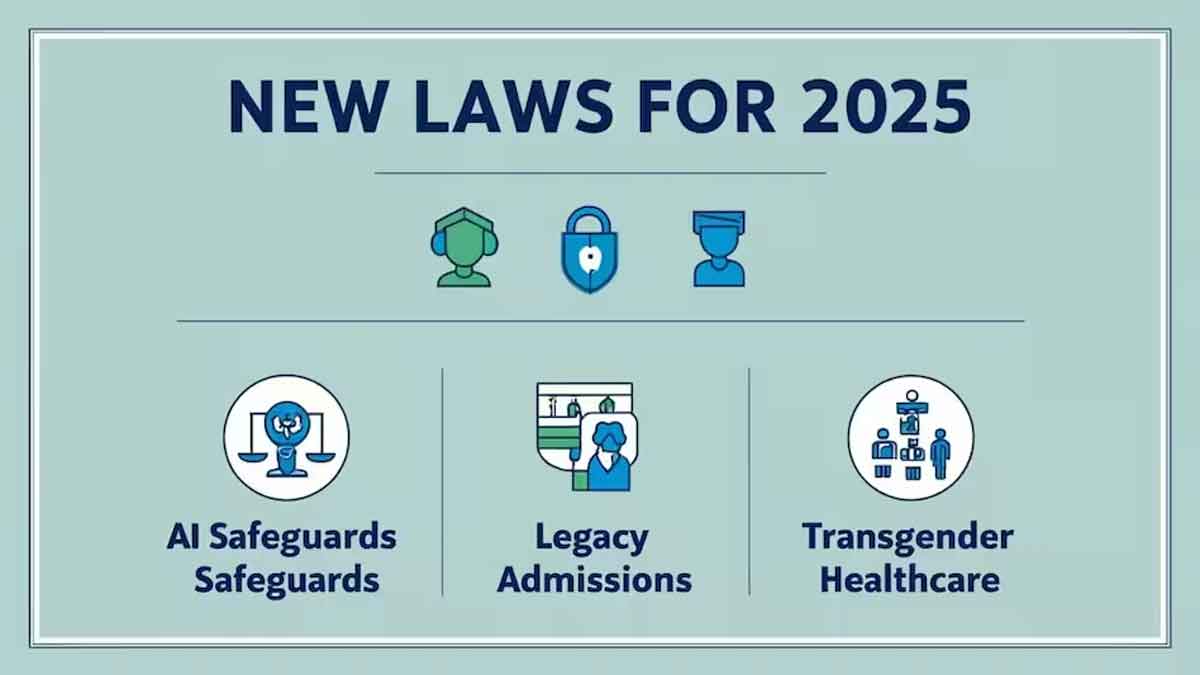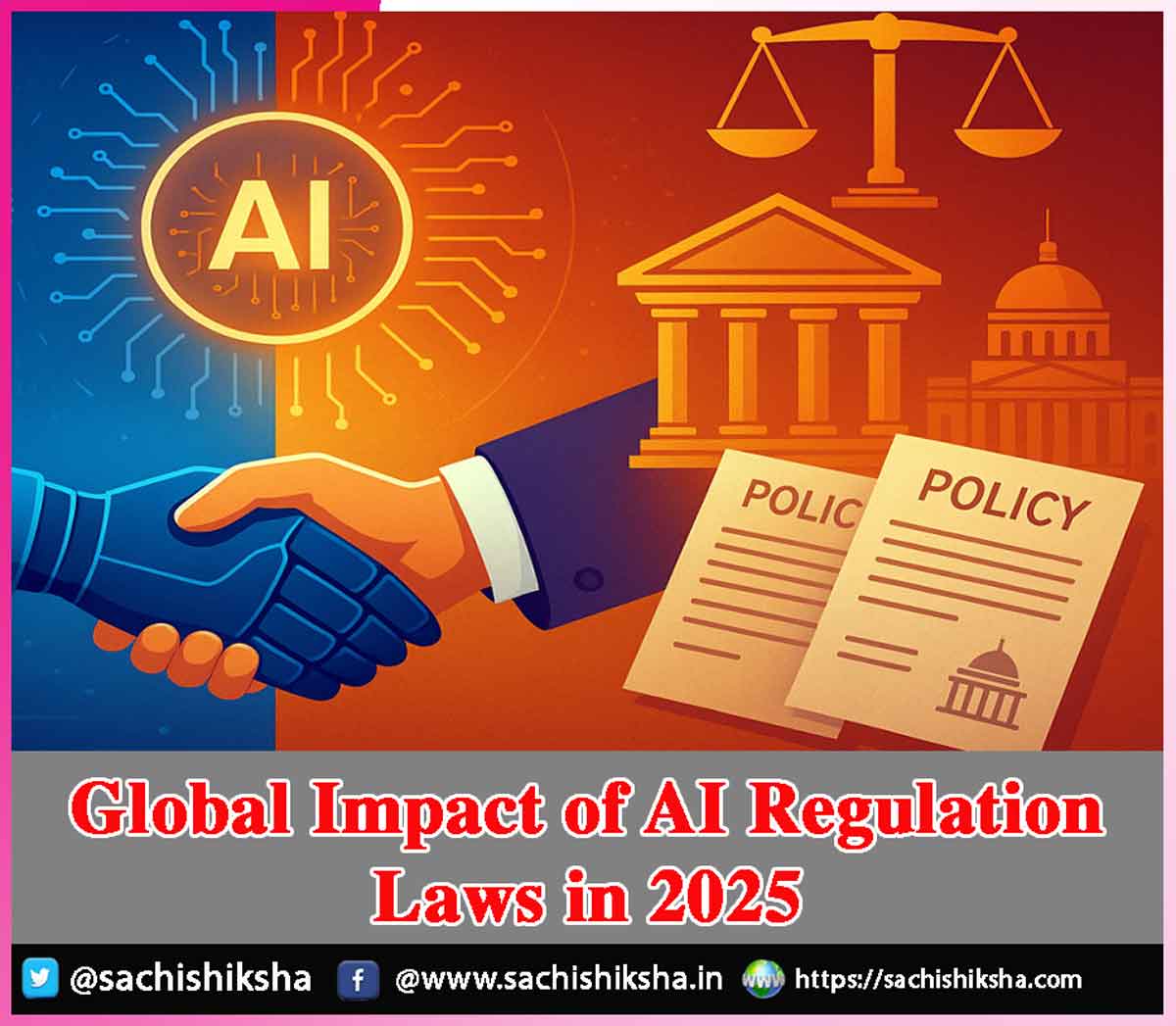Global Impact of AI Regulation Laws in 2025
Introduction: The global landscape of artificial intelligence (AI) regulation in 2025 is marked by a complex interplay of national strategies, ethical considerations, and international collaborations. Countries are striving to balance innovation with safety, leading to diverse approaches that reflect their unique political, economic, and cultural contexts.

Table of Contents
Objective of AI Regulation
The primary goals of AI regulatory laws involve the following:
- Safeguarding Human Rights and Privacy: AI systems frequently handle significant volumes of personal information. Regulations aim to avoid improper use of information while also protecting people’s private information and rights.
- The responsibility and Openness: Laws aim towards guaranteeing that AI systems behave publicly and that both their developers and consumers are held liable for any negative effects.
-
The European Union: Pioneering Comprehensive AI Regulation
The European Union (EU) has taken a leading role in AI regulation with the enactment of the Artificial Intelligence Act (AI Act) in 2024. The law offers a concern-based methodology that divides applications of artificial intelligence into four categories: inappropriate, high, restricted and no risk. Unacceptable-risk applications are banned, while high-risk systems must meet stringent requirements, including transparency, security, and conformity assessments.
The AI Act also covers universal AI, requiring accountability and further reviews of high-capability algorithms. The legislation establishes the European Artificial Intelligence Board to ensure conformity and foster partnership between the member countries. This regulatory approach aims to protect fundamental rights, ensure safety, and foster innovation within the EU.
The original rule aimed to limit China’s access to cutting-edge computing technologies but faced criticism for its complexity and potential to hinder American innovation. The revised approach seeks a simplified global licensing system based on direct government agreements. Moreover, the U.S. has set up its own AI Safety Institute (AISI) to assess and guarantee the secure operation of advanced artificially intelligent models. This institute is part of an international network formed during the AI Seoul Summit in May 2024, comprising institutes from various countries, including the UK, Japan, and Singapore.
-
China: Emphasizing Control and Socialist Values
China’s strategy for AI governance is centered on preserving control while connecting AI research with revolutionary values. Although a formal legislation on artificial, the government has adopted “Interim Measures” mandating AI to safeguard both businesses. The Chinese government closely regulates businesses, especially foreign-owned ones, and grants itself strong exceptions to these rules. This approach ensures that AI development remains under strict state supervision, reflecting China’s broader strategy of technological self-reliance and control over information dissemination.
-
United Kingdom: Prioritizing AI Safety and Innovation
Initially formed as the Frontier AI Taskforce in April 2023, the institute evolved into the UK AISI in November 2023, with a focus on balancing safety and innovation. Unlike the EU’s legislative approach, the UK has been cautious about early legislation, considering the potential to stifle sector growth and the rapid pace of technological advancement. This initiative reflects the UK’s commitment to fostering safe AI development while maintaining a flexible regulatory environment that encourages innovation.
-
Singapore: Mediating Global AI Safety Efforts
Singapore has established its position as an independent arbiter in international AI safety issues. It is going to announce the “Singapore Consensus on Global AI Safety Research Priorities” at the international conference on Learning Representations in May 2025.This blueprint encourages international cooperation on AI safety research, focusing on evaluating AI impacts, defining desirable system behavior, and managing system conduct. By fostering collaboration amid growing U.S.-China tensions, Singapore aims to bridge divides and promote unified global efforts for safer AI development.
-
Brazil: Developing Risk-Based AI Legislation
Brazil is currently drafting extensive AI legislation, with an emphasis on classifying AI systems according to the danger that they create. The proposed law defines high or excessive risk systems as those that can harm health or safety or exploit specific vulnerabilities. AI developers would be required to conduct risk assessments and manage compliance accordingly.
Brazil launched a $4.07 billion proposal for investments in artificial intelligence in July 2024, with the goal of achieving technical autonomy and competition.
-
India: Embracing AI Regulation and Innovation
India is actively considering AI regulation, with discussions around adopting a regulatory framework inspired by the European Union’s Digital Markets Act. The Indian government is considering a DMA-style strategy for “systemically important digital intermediaries,” although no specific plans had been made as of April 2024. Additionally, India is participating in international AI safety initiatives, such as the Statement on Inclusive and Sustainable Artificial Intelligence for People and the Planet, signed by 58 countries in February 2025. This proclamation defines the principles for creating AI that is accessible, honest, trustworthy, secured, and dependable.
-
Global Collaborations and Divergences
International efforts to regulate AI have seen both collaboration and divergence. The AI Framework Conference in February 2025 gave rise to a Declaration on Comprehensive and Responsible Artificial Intelligence for Humans and the Environment, which had been adopted by 58 nation-states, namely France, China and India. However, the United States and the United Kingdom declined to sign the declaration, citing concerns over its adequacy in addressing global governance and national security implications.
-
Minimizing Discrimination and Biases:
AI systems can portray or exaggerate biases in information. Promoting security and regulations, especially in areas with elevated risks such as healthcare, banking, insurance, and automotive autonomy, ensures that AI systems are safe and worthy of functioning effectively.
-
Influence on Companies and Development.
AI legislation has far-reaching ramifications for several areas, including science and technology, medical care, banking, and defence. Corporations must manage various regulatory contexts, preserving compliance while encouraging entrepreneurship. For example, the EU’s AI Act requires stringent regulations for high-risk applications, impacting industries such as healthcare and travel.
In the United States, the trend towards fostering AI development free of political restraints is intended to boost research and retain competitiveness internationally. However, questions linger about the possible consequences of less severe rules.
-
The Future Perspectives: Approaching Harmony and Ethical AI
As AI advances, the necessity for standardized international laws becomes more evident. Initiatives such as the Singapore Declaration and worldwide summits seek to promote collaboration and develop universal standards. Combining creativity, ethics, as well as security will be critical in creating the future of AI.
Nations must collaborate to address issues including security of information, algorithmic bias, and the possible exploitation of AI technologies. By fostering honesty, responsibility, and diversity, people around the world can reap the positive consequences of AI while minimizing its risk.
Concerns
AI legislation confronts a number of issues, including the rapid speed of technical progress, the difficulty of clearly defining AI, jurisdictional disparities, and the possibility of excessive regulation inhibiting innovation. The most critical challenge is to integrate creativity with moral requirements.
Carefully planned legal structures seek to guarantee that AI technologies enhance humankind while minimizing danger. As AI advances, worldwide collaboration and adaptive legislation will be vital for tackling new risks as well as possibilities.















































